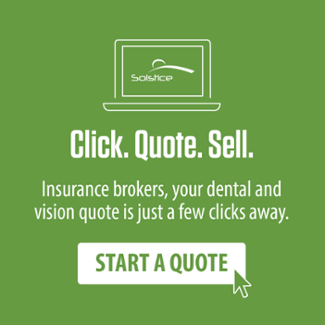By Andrew Hickey on Feb 22, 2023 5:53:09 PM
More people are understanding the connection between oral health and overall health. Poor oral health and lack of oral care can lead to cancer, diabetes, and heart disease. In turn, these conditions can cause insurance premiums to go up each plan year.
Employees are placing a higher emphasis on having the right insurance for all their health needs. Eight out of 10 employees are choosing to add coverage to their current benefits. This makes ancillary benefits, like dental and vision, an attractive option to have for current and prospective employees.
Dental is also growing in importance when people are searching on the public insurance marketplace. It’s considered an essential health benefit by Medicaid for children under age 18. However, only some of those plans cover adult dental care. That leaves the door wide-open for insurance brokers to offer dental plans to individuals who still need the coverage.
Key Takeaways:
- Gain and retain talent: over 80 percent of employees in the U.S. want dental benefits.
- Save time and money: more than 164 million hours of work is missed due to dental issues and visits.
- Brokers are needed on public exchanges: brokers facilitate 85 percent of these insurance applications.
- Use private exchanges: these exchanges offer more variety when selling to individuals and groups like single-source billing and customized plans.
- Adjust your sales pitch: Be interested in your clients and be accessible via email, text, and social media.
When it comes to pitching dental, or any insurance product, you will come across clients with varying needs. There will be some who want to tighten up spending. Then there will be clients who are looking to build on their existing dental and vision offerings. So, it helps to have dental products with multiple configurations so you can meet those varying needs.
The bottom line: insurance brokers who want to make more commissions should know how to sell dental insurance. Additionally, if you have products you can bundle for your clients, this will encourage them to work with you over another agent or brokerage.
Highlight the importance of dental to your clients:
- Employees are asking for dental: Over 80% of American workers want dental benefits – they should be considered important to the overall benefits package offered by an employer. Having that clean-mouth feel from a dental checkup can be satisfying. But really no one enjoys going to the dentist. However, if it’s a choice between the convenience of routine care and a dental emergency the answer is clear. And employees can save on cost, or pay nothing at all, for these routine visits. They can include regular cleanings, X-rays, and office visits. Think of it as a yearly physical with a family doctor.
- Adding dental benefits saves on expense, with little cost: Nearly 8 in 10 people in the U.S. with group dental benefits visit the dentist one or more times per year. That is compared to less than half of those without coverage. Thanks to their dental benefits people can actively manage their oral health. Untreated dental issues lead employees to miss work. Employed adults are shown to lose more than 164 million hours of workeach year due to dental disease or extensive dental visits. That doesn’t even factor in high-cost dental and medical claims incurred by employees. When bundled with other insurance, dental and ancillary benefits come at a low cost for clients. These costs will vary based on individual plans and family plans.
- Happy employees make for productive and loyal employees: In addition to cost, dental benefits lead to retaining the best employees in the field. Satisfied employees are much more likely to stick around and report overall job satisfaction. This also leads to boosted productivity and efficiency. It may be worth discussing the option of also having these benefits available for part-time or contract employees if it makes up enough of their workforce.
Show your clients why they need to collaborate with you:
- Brokers are an important asset: As a broker you are valuable in selling private dental and ancillary products. And you can play a key role in public exchanges. 85 percent online insurance applications are facilitated by brokers, according to CMS (the Centers for Medicare & Medicaid Services). So that is your cue to get involved, if you’re not already. You will be able to demonstrate your expertise in dealing with insurers and lend your vast knowledge of the insurance products. Enrollment can be a cumbersome process. Your white-glove service will really make you stand out.
- Selling on public exchanges: Nearly 21 million people under the age of 65 gained health care coverage through Medicaid. And they need qualified brokers to work with: just like you! In terms of dental, there are 280 million people covered by some form of benefits, according to the NADP Dental Benefits Report. That’s 85% of the population! To meet this demand, there is an increasing list of carriers listed on the exchanges. More choice means greater opportunities for you to sell to a variety of clients. There are also state based marketplaces (SBMs) which offer benefit plans to individuals and groups. These exchanges include Covered California, Florida Health Choices, and the Washington Health Benefit Exchange. Being licensed to sell on state exchanges can really add to your arsenal of sales opportunities. Be sure to find products that are ACA certified if required by the client. As a broker you will be compensated for your work as part of the federal exchange. Brokers must be certified to sell on state and Federal exchanges.
- Selling on private exchanges: There are also private exchanges where brokers can sell ancillary products. It’s a great way to boost your portfolio. Clients can also improve the benefit offerings to their employees. Your clients will have more insurance options and the plans are not required to be ACA-compliant. This means a variety of dental and vision plans, in addition to fertility benefits, benefits for catastrophic life events, and wellness programs. These are not typical features of federal or state sponsored benefit plans. When selling to groups you can make life easier for the people in HR by working with a private exchange that uses single source billing. These platforms can be customized, giving brokers and groups more control over the benefits they choose to offer their employees.
You can grow your business:
- Promote the importance of dental benefits to clients: You may have clients who are on the fence about investing in dental benefits. It is more than worth the time to educate them. As a broker you understand your products and the importance of dental and ancillary benefits. So, you will want to share that knowledge with your clients. It will boost the image of your client if they offer robust dental to current and prospective employees. This could cover services like major dental procedures, whether that’s for braces or cosmetic dental work. You can really drive home the value of your dental offerings by showing a cost estimate of a benefits package, both with and without dental.
- Offer dental discount plans: You can avoid covering the cost of administering claims, and earn higher commissions by having dental discount plans in your portfolio. A plan with no claims and built-in discounts is very appealing to individual clients. You may also have self-insured groups who are in the process of growing or scaling back. They may not want the hassle of administering their own plans. In either case, your clients will pay much less for coverage than they typically would for dental insurance. Renewals have the potential to be higher on these plans. Clients will not experience spikes the following year due to utilization and claim submission. They will simply pay the set cost to purchase the plan for each employee.
- Boost your client base and word-of-mouth: You are invaluable as a broker for your ability to deliver ideal solutions to both individuals and groups. They could go on a public exchange and look for benefit plans. However, you have the extensive portfolio of benefits that will perfectly match their needs. Say for example your clients are looking for a plan with lower premium fees.
Understanding the needs and concerns of your clients:
- Selling to Millennials and Gen Z: It’s important to understand the buying habits of millennial clients and Gen Z consumers. This extends from the products you offer to the way you market to and communicate with these clients. Millennials like products that align with their personal values and enjoy staying connected to the causes they believe in. Meanwhile, Gen Z consumers look for companies that speak authentically and are transparent about the products they offer. You can demonstrate the features of your benefits and the values they represent through infographics. This will allow potential clients to thoroughly review your offerings and compare them to other dental insurance products. You can harness the power of your social media channels to interact and connect with this audience. You will also want to be accessible via email and text message to answer questions.
- Selling to baby boomers: The market for individual insurance grows every year for another reason: baby boomers. The “Great Resignation” will be making way for the “Great Retirement,” with 75 million baby boomers expected to retire by 2030. Insurance brokers can position their business to reach these consumers as they continue to retire and require supplemental plans. It is key to remember: dental coverage is optional under Medicaid, and coverage needs change with age. So, these clients will look for coverage that includes dentures, implants, and other rich benefits.
- Adjust your sales pitch: Regardless of the audience, it is important to try new approaches for pitching dental and ancillary benefits. Forcing a sale is no longer the way to close a deal. Instead, your clients will react more positively if you take the time to learn about them, figure out their concerns, and show professional courtesy. Instead of winging it you can look up information about your prospects and come to the table with insight to share. This will score you points with them. If the consumer has not done their own research, they will learn something from you.
- Meet your clients face-to-face: Whether you’re engaging with a Gen Z consumer or a baby boomer, in-person meetings are proven to be more successful. In a study by Cornell University, a group of children and adults both showed to perform better when they could observe an instructor’s hands, as well as their eyes and facial movements. This means a lot for brokers, especially come open enrollment time. While you can’t be on-site for your clients every single day, you can maintain a strong presence during enrollment time. And be sure to carve out time to answer questions one-on-one.
There is great value in dental benefits for your brokerage and your clients, whether they are individuals or groups. You want to keep yourself in the best position possible, not just during open enrollment. We hope this will inspire you to double down on the products you have available or take a closer look at adding dental products to your portfolio.

Any questions about your current Solstice products? Login to your portal on https://www.solsticemarketplace.com/
Want to start selling Solstice? Give us a call at 877-760-2247 or email us at sales@solsticebenefits.com




comments